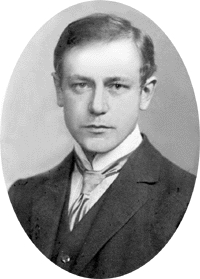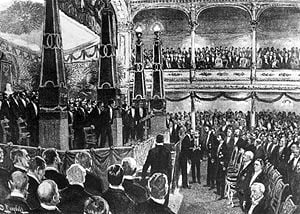by Folke Henschen*
On 10 December 1975 the 75th Nobel banquet was held. On that day, Folke Henschen told radio listeners his personal memories of the very first Nobel Prize awards, which he experienced as a student marshal. What follows here is a more detailed version.
After long protracted negotiations, partly with the French government (which sought to impose a very hefty tax on the Nobel estate) and partly with the Nobel family, the first awarding of five Nobel Prizes could finally take place on 10 December 1901 – four of them given out in Stockholm and one, the Peace Prize, in Christiania, as Oslo was then called. Five years had passed since Alfred Nobel had died in San Remo, on 10 December 1896.
In the days leading up to the awarding of prizes, there was certain tension in the air. The Nobel Laureates’ names had been kept secret – they were not, as now, revealed months in advance. When three distinguished German – speaking gentlemen arrived by train from the south and were taken to the Grand Hotel, it was clear that they must be the Nobel Laureates. International traffic was not as commonplace then as now.

Photo of Folke Henschen kindly provided by his son, Anders Henschen.
The Nobel Prizes were presented in the large hall of the Royal Swedish Academy of Music1 at Nybroviken. The unpretentious, rather boring hall had been richly decorated under the supervision of the much sought-after royal architect, Agi Lindegren. As one of the so-called student marshals, decked out in student cap and a broad silk blue-and-gold band over my left shoulder, I had an excellent view of everything from my seat in the gallery to the right of the podium. The large bandstand where the royal orchestra was to play was completely decorated with plants and pine boughs. Centered at the back of the stage, beneath a giant laurel wreath tied with blue-and-gold ribbon, was a large broad obelisk with a white bust of Alfred Nobel. At the front there was a lectern and four more obelisks with the inscriptions PHYSICS, CHEMISTRY, MEDICINE, LITERATURE. Just in front of the stage were three armchairs for royalty, and behind these was a semicircle of chairs for the prize winners, the presenters, and attendants. Back of the semicircle there were places for all the intellectuals, distinguished officials, and military officers from Stockholm and around the country.
The hall filled gradually with people dressed in festive attire. Then, the three current prize winners entered and sat down, without music or fanfare as now is customary. First came the stately German, Wilhelm Conrad von Röntgen, with his large dark professor’s beard, then the smiling, blond, clean-shaven Dutchman, Jakobus Hendricus van t’Hoff, followed by the elegant German Nobel Laureate in Medicine, Emil Adolf von Behring. Last came the French minister, who was to receive the Nobel Prize in Literature for his countryman, the poet, Sully Prudhomme, who was ill. Finally, the royal family entered: in the middle, Crown Prince Gustaf–later to become King Gustaf V–standing in for King Oscar who had been forced to travel to Christiania because of the threatening break-up of the Swedish Norwegian union. With him, came the 19-year old Prince Gustaf Adolf (much later our Gustaf VI Adolf) together with Prince Eugen. The seating arrangement meant that the royalty sat more or less with their backs to the Nobel Laureates and presenters.

The first Nobel Prize award ceremony at the Musical Academy in Stockholm.
When the royal family was seated, the royal orchestra burst forth with a pompous festival overture by Ludwig Norman. Thereupon, the Nobel Foundation chairman, the former Prime Minister E G Boström, rose to the lectern and described in a speech of some length Alfred Nobel’s life, character, discoveries, and his warm wish to benefit mankind with annual awards from his fortune.
Thereafter, the Swedish Academy’s powerful permanent secretary, C.D. af Wirsén, came forward and read a “poem” – or so it states in the program I still have. I still remember his deep grandiloquent voice: “No desire became duty, no striving that bore down on Swedish shoulders” – and the end: “Two things induce us to bear the heavy responsibility: the will of Death and our Mother’s honor.” Then followed an augmented men’s quartet that sang the old mighty student song, “Open thy gates, thou radiant temple garden of memory”.
At last, the actual presentation of prizes began. In regard to the scientific prizes, the presentations were made by representatives of the two institutes that selected the recipients, rather than by experts in the pertinent fields, as later became usual. Thus, the old Director General of the National Archives, C.T. Odhner, Chairman of the Academy of Sciences, gave an account of how the Nobel Laureate in Physics, Röntgen, discovered the radiation that is named after him and recited the bases for the Nobel Laureate in Chemistry, van t’Hoff’s discoveries pertaining to osmotic pressure and chemical dynamics, both of which subjects were certainly foreign to him. After each statement, he stepped down from the podium and led the appropriate Nobel Laureate forward to receive his diploma and medal from the hand of the Crown Prince.
Thereafter, the President of Karolinska Institutet, Professor Karl Mörner, came to the lectern and described Behring’s discovery of anti-diptheria serum, whereupon Behring received his award in the same way. Finally, Wirsén spoke about Sully Prudhomme and read part of his famous symbolic poem, ‘Le vase brisé’ (The Broken Vase). The vase has a crack “tout bas, invisible au monde” which the poor vessel feels spreading, so that its contents leak out. “Il est brisé, n’y touchez pas” – touch it not! Yes, certainly it was beautiful, but …
And so the awarding of the prizes came to an end. The Royal Orchestra played a march by August Söderman, the royal family rose, and the hall emptied. It was not far to the Grand Hotel2 where a festival banquet stood ready and to which even we marshals were invited. There were many toasts and a splendid ambience. And in the small hours, two marshals carried the little van t’Hoff in a gold chair around the room.
And so it was, then, that the first – and one could say historic – Nobel Prize ceremony ended.
The day after, my parents were visited by some guests of the previous night’s celebration, among them the famous meteorologist, Professor Hugo Hildebrandsson, from Uppsala (who was married to Wirsén’s sister). Roaring with laughter, Uncle Hugo reported that ‘the young bohemians’ were extremely upset that Sully Prudhomme got the Nobel Prize in Literature and contemplated sending a letter of protest to Leo Tolstoy. And who were these ‘young bohemians’? Yes, they were Verner von Heidenstam, Oscar Levertin, Per Hallström, Ellen Key, and probably August Strindberg. That is, the generation which is now called the “90s classicists”.
To award prizes in science is very hard, as I know from my own experience over several years of chairing the Medical Nobel Committee. But to award annually an international Nobel Prize in Literature so as to win approval in all quarters and among all literary tastes borders on the impossible!
1. The Nobel award ceremony was held at the old Royal Swedish Academy of Music from 1901 to 1925. From 1926 onwards it has been held at the Stockholm Concert Hall, with a few exceptions.
2. The Banquet was held at the Grand Hotel in 1901-1929 and from 1930 onwards in the City Hall of Stockholm.
*This is an eyewitness report from the first Nobel Prize award ceremony in 1901 by a 20-year old student, Folke Henschen, later to become Professor of Pathological Anatomy at Karolinska Institutet and Chairman of the Medical Nobel Committee (1942-46).
Translated by Robert E. Savage.
Published in Recip Reflex 1/1976, KABI Internal Review.